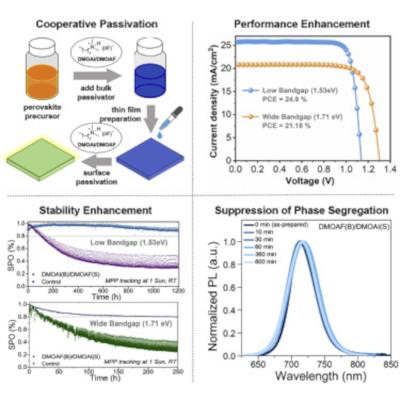A team of researchers at EPFL have developed a method that improves both power conversion efficiency and stability of solar cells based on pure iodide as well as mixed-halide perovskites. The new method aslo suppresses halide phase segregation in the perovskite material. The research was carried out by the groups of Professors Michael Grätzel and Ursula Rothlisberger at EPFL and led by Dr Essa A. Alharbi and Dr Lukas Pfeifer.
The method treats perovskite solar cells with two alkylammonium halide modulators that work synergistically to improve solar cell performance. The modulators were used as passivators, compounds used to mitigate defects in perovskites, which are otherwise promoting the aforementioned degradation pathways.
In their recent study, the researchers were able to use the two modulators to stop halide segregation and thereby substantially reduce the drops in power-conversion efficiency seen in long-term use of PSCs.
The new approach resulted in power-conversion efficiencies of 24.9% for one perovskite composition (α-FAPbI3) and 21.2% for the other (FA65MA35Pb(I65Br35)3). About 90% and 80% of the initial efficiencies were retained after 1200 and 250 hours of continuous operation, respectively. The authors write: “By addressing the critical issue of stability, our results represent an important step towards large scale practical applications of PSCs.”
